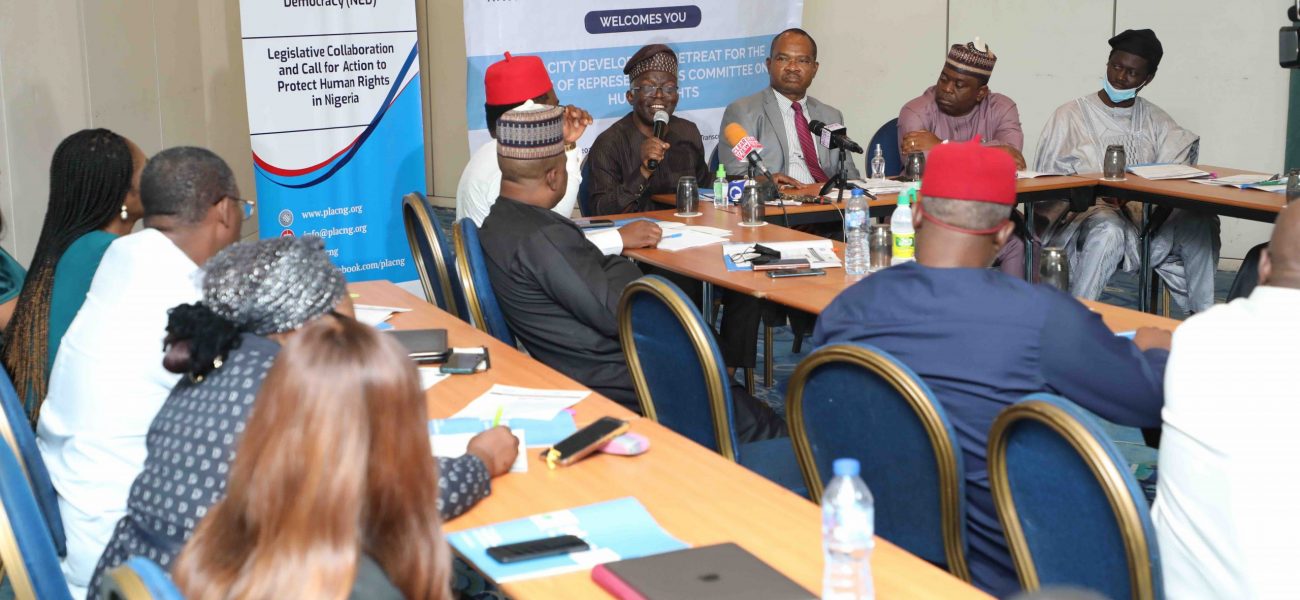The House of Representatives Committee on Human Rights held a Capacity Development Retreat for its members in Abuja on Monday, 21st March 2022. It was organised in collaboration with Policy and Legal Advocacy Centre (PLAC) with support from the National Endowment for Democracy (NED). The retreat was aimed at developing a mechanism to respond to human rights issues affecting Nigerians. At the retreat, keynote presentations on the ‘Current Context and State of Human Rights Protection in Nigeria’ were delivered by Human Rights lawyer and activist, Femi Falana, SAN and the Executive Secretary of the National Human Rights Commission (NHRC), Anthony Ojukwu, SAN. Select institutions and agencies of government and civil society organisations were also present at the retreat. They contributed to conversations on improving legislative response to human rights protection in Nigeria.
At the retreat, it was resolved that the Committee will develop a mechanism for receiving complaints of human rights violations from the public. The Committee pledged a follow-up on these complaints using its legislative powers of oversight of the Executive arm of government. The Committee also agreed to hold regular consultation with human rights organisations and stakeholders, with a view to curbing violations of human rights in the country. It was also resolved that a website will be setup by the Committee, where citizens can submit petitions of human rights abuse and where civil society organisations can submit reports on the state of human rights in the country. PLAC was given the responsibility to help create the website.
Welcoming legislators and participants to the retreat, Chairman of the House of Representatives Committee on Human Rights, Hon. John Dyegh stated the Committee’s commitment to building capacity to deal with human rights violations in Nigeria by partnering with the NHRC, the National Agency for the Prohibition of Trafficking in Persons (NAPTIP), other government agencies, non-governmental organisations (NGOs), and other partners working on human rights issues. He also highlighted some of the Committee’s efforts to address rights abuses, which include ensuring human rights training for security agencies, introduction of several bills in the House, among others.
In his opening remarks at the retreat, Executive Director of PLAC, Clement Nwankwo noted that several cases of human rights violations perpetrated by government agencies, particularly arbitrary arrest and detention of individuals, stem from abuse of power by public officials for personal reasons. He therefore stressed the need for agencies of government to understand that their service is to the State and not to individuals who occupy positions of authority. He called on the Committee to work with government agencies to reduce the incidence of human rights violations.
In his presentation, rights activist, Femi Falana, stated that Nigeria has one of the best human rights regimes in terms of laws enacted to improve human rights protection in the country. He however, explained that the enforcement of these laws is very poor. He cited several provisions of law that are breached on a regular basis, through acts such as subjecting criminal suspects to torture and making statements without legal advice or representation, rejection of gunshot victims by health care providers, discrimination against persons with disabilities, among others. He therefore enjoined members of the Committee to monitor the enforcement of these laws by relevant government agencies and also ensure appropriation of funds to agencies such as NHRC, Legal Aid Council, National Orientation Agency and others, to enable them deliver services for the protection of human rights.
Executive Secretary of NHRC, Anthony Ojukwu speaking at the retreat, highlighted some of the efforts of his Commission towards the protection of human rights. Among these is the work of the Commission to mainstream human rights protection by security agents on the frontline in insurgency operations, which he stated, has resulted in significant improvement in the performance of the military. Also, NHRC has assisted in the institutionalisation of ‘Human Rights Desks’ in all military offices, ensuring that boko haram detainees are tried, among other efforts. He also stated that the NHRC has an office in every State of the Federation and engages with the government, the legislature, civil society and citizens at that level to deal with human rights issues. He enjoined the Human Rights Committee of the House of Representatives to look into the condition of detention centres and facilities for persons with mental health conditions, in its efforts to curb abuse of rights.
The retreat kicks off a citizens’ driven project by PLAC to address human rights violations in Nigeria from a legislative perspective, where citizens will be enjoined to submit petitions to the Human Rights Committees of the Senate and House of Representatives on human rights abuses experienced or witnessed by them. In addition, PLAC will issue ‘call-to-action’ notices over identified cases of human rights abuse, encouraging citizens to send letters to the Committees, to seek their intervention through enforcement of their oversight powers on violating authorities. Citizens may also contact the violating authorities to protest these abuses and call for a stop to them.
PLAC is committed to working with the Human Rights Committees of the National Assembly to develop an effective mechanism for responding to human rights petitions and proffer remedies to victims who suffer violation of their rights.

